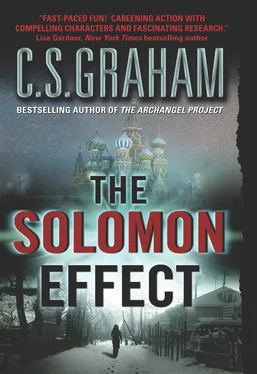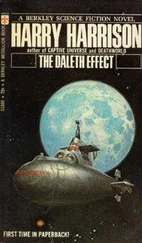He circled around the rusty iron fence enclosing the half-ruined church and started back. This place gave him the creeps. It reminded him of his grandparents’ house in Havana-lost, like these houses, to the spread of Communism.
Rodriquez had taken a night class in twentieth-century history in college, but it had left him more confused than anything else. He’d always been told that France and England declared war on Germany because Hitler invaded Poland. But the problem with that explanation was that the Russians had invaded Poland at the same time, in alliance with the Nazis. The Russians had also invaded Finland, although nobody declared war on the Russians. And when the war was supposed to be over, the Russians were still in Poland-and a hell of a lot of other places, too. So it seemed to Rodriguez that if the war had been fought to free Eastern Europe from invaders, then the whole thing had been a failure. Sure, it had gotten rid of the Nazis. But the Nazis had always been a lot more interested in fighting the Communists than they were the Western Allies-which was why they’d let the Brits escape at Dunkirk, and why they kept resisting Roosevelt’s repeated efforts to drag them into a war with the States. Only, for some reason, people seemed to forget that.
Rodriguez was breathing hard now, legs pumping as he sprinted down a quiet lane, his wet T-shirt sticking to his back despite the chill. He passed a park with a statue of Lenin staring straight ahead, as if he could see all the way back to Moscow, and he found himself wondering what would have happened if the West had just let the two motherfuckers fight it out. Hitler and Stalin. Nazis and Commies. He had a feeling the world would look a lot different today.
He slowed to a walk as he neared the house, then did a hundred push-ups and a hundred crunches in the yard before heading inside.
“Heard from our guy in Berlin yet?” he asked Salinger as he let the kitchen door slam behind him.
“Nothing yet.”
Rodriguez grabbed a liter of water and downed it in one long pull. “Something’s gone wrong.”
“Could just be a delay.”
Rodriguez shook his head. After years of running operations, he’d learned to trust his gut. “Get onto our source at Aeroflot.”
Salinger tapped at his computer for a few minutes, then looked up. “The representative from Langley checked in for his flight to Kaliningrad twenty minutes ago.”
“Fuck.” Rodriguez glanced across the kitchen to where the other men were clustered around a big oak table and eating breakfast out of takeout containers from a local inn. “Dixon, you and Salinger come with me. We’ll get the son of a bitch when he lands.”
Burrowing deep into her jacket, Tobie stepped off the flight from Copenhagen into an icy Baltic wind and found herself staring into the muzzle of a machine gun.
A stony-faced circle of guards herded the flight’s passengers across the nearly deserted tarmac to an ugly Soviet-era terminal. A row of battered booths controlled the passage from the immigration hall to customs, but only one booth was manned. Waiting in the endless line with her bag clutched to her side, Tobie had plenty of time to watch the way the tall, thin guard was subjecting each passenger to a ruthless scrutiny.
Something was wrong.
Despite the frigid atmosphere of the room, she suddenly felt hot. CIA personnel were typically assigned to embassies, a position that conveniently provided them with diplomatic immunity. Intelligence personnel without diplomatic passports were said to be under “unofficial cover.” In this case, “unofficial” basically meant exposed.
Without the immunity afforded by a diplomatic passport, Tobie was just an ordinary foreign national. And while the Cold War might be over, some things hadn’t really changed in Russia. If the Russians knew or even suspected her connection to the CIA, she could disappear into a system that would treat her like-well, like the U.S. treated the guys they sent to Guantanamo Bay and Abu Ghraib and a couple dozen other secret prisons scattered from Afghanistan to Rumania to Morocco. When the guard finally raised his head and called out, “Next,” Tobie jumped.
“Sdrasvytye,” she said with a smile as she stepped up to the booth.
The guard stared at her passport, his dark bushy eyebrows drawing together in a frown. She expected him to say, “And what is the purpose of your visit?” But he didn’t say anything. His frown deepening, he swung away to peck at his computer’s keyboard.
“You will wait to one side,” he said, jerking his chin toward the cinderblock wall behind him.
Tobie stopped breathing. “Is there a problem?”
“You wait,” he told her, already motioning to the next person in line.
A stirring at the edge of the room drew her around. A barrel-chested man with short-cropped dark hair, full lips, and a crooked nose strode across the chipped linoleum floor, his face set in harsh lines as he walked up to her. He was casually dressed in a black turtleneck and jeans, but there was no doubt from the way everyone deferred to him that this was one seriously scary individual.
“Ensign October Guinness?” he snapped.
Ensign? Holy shit. How did he know that? Tobie’s voice shook. “Da.”
He said in Russian, “Come with me, please.”
Andrei Gorchakove had graduated from the Academy and joined the KGB in the dying days of the once-mighty Soviet empire.
Like most Russians, he remembered those chaotic years with bitterness and shame. Ironically, both the Americans and Osama bin Laden liked to take credit for the collapse of the Soviet Union. Andrei himself thought the fault lay with the slow bleed of the Afghan War and the environmental disaster at Chernobyl. But whoever or whatever the cause, there was no denying that the breakup of the Soviet Union had brought terrible hardship to them all-or at least, to most of them.
Bereft of the ideology that had guided them for nearly a century, the Russian people had stumbled through a dark and terrible period as the millennium drew to a close. The state collapsed. Hordes of ruthless oligarchs calling themselves capitalists gobbled up the wealth of the country and brought a once-proud nation to her knees. KGB men like Andrei were forced to take jobs as bodyguards and day laborers, just to stay alive.
But they had a saying in Russia: There’s no such thing as an ex-KGB man. In the end, the men of the KGB decided they’d had enough. The oligarchs were thrown into prison, or fled to places like England and Israel. A new war against the Chechens united the people and fired them with patriotism; the downward slide into poverty and despair was brought to an end. Once again, Mother Russia was beginning to stand tall.
Now, thanks to the Americans’ own misadventures in Afghanistan and Iraq, it was the United States that was feeling the strains of overreach, while the revenues from soaring oil prices gushed into Russia’s coffers. There had been a time, Andrei knew, when the Americans had made the mistake of thinking that Russia was finished-that they could treat their erstwhile rival like a conquered nation. In that, they had erred. Andrei had no idea why they had sent this young woman, this Naval ensign, to Kaliningrad, now. But by the time he was finished with her, he would find out.
He ushered her into a frigid, windowless room with a steel table and one metal chair. Her checked bag lay open on the table, the clothes strewn across the metal surface. “Pa-zhalista,” he told her. “Sit down.”
She sat, her face ashen and drawn with fear, her gaze following him as he went to stand on the far side of the table. She was young, no more than twenty-five, dressed like most Americans in jeans and sports shoes, with a navy V-necked sweater pulled over a button-down shirt.
Читать дальше











